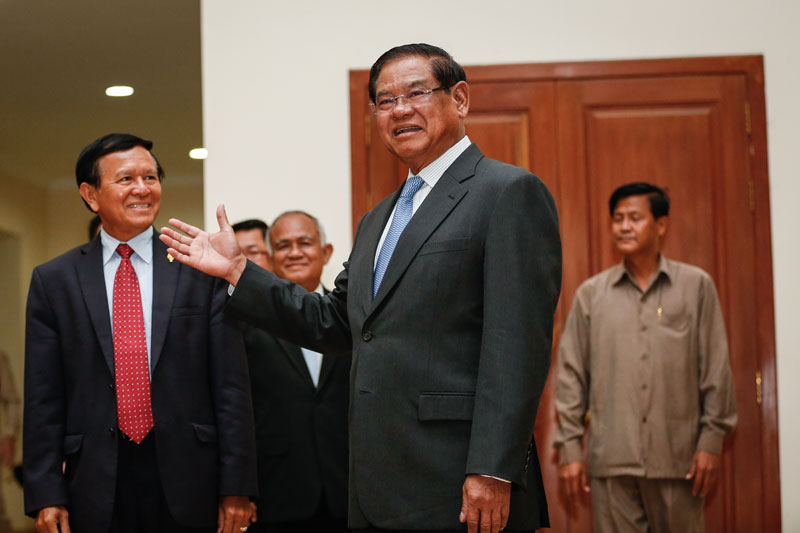Interior Minister Sar Kheng and deputy opposition leader Kem Sokha met at the National Assembly on Monday to discuss the recent jailing of 14 CNRP activists over the “insurrection” at Freedom Park a week before last year’s July 22 political deal.
In a sudden decision last month, 11 CNRP activists were found guilty on insurrection charges over the July 15 protest to reopen Freedom Park that turned violent, and a further three have been arrested this month after an appeal from Prime Minister Hun Sen.

Opposition leader Sam Rainsy has been in Europe and the U.S. since the day the 11 sentences were handed down on July 21, and Mr. Sokha has led the opposition party’s campaign to have the activists released.
Monday’s meeting between Mr. Kheng and Mr. Sokha took place behind closed doors, and the two leaders—wearing broad smiles as they walked out—declined to speak to reporters, sending spokesmen to address the media instead.
Interior Ministry Secretary of State Sak Setha, who represented Mr. Kheng, said the two leaders discussed many issues, including the activists, despite a CPP spokesman saying Sunday that such talks would impact judicial independence.
“Regarding the arrests of the people who committed crimes, that is the legal process. In fact, the two leaders discussed the issue but agreed that the discussion would not in any way impact on the legal process,” Mr. Setha said.
“We are trying to look for a method to give advice and ideas [to the courts] but those ideas and advice must not affect the legal process or the court’s authority,” he added.
Asked to specify what such advice could entail, Mr. Setha said that one example could be that the legal processes should be followed properly, or that the CNRP activists get lawyers. In fact, the 11 activists convicted of “insurrection” and the three others arrested this month already have lawyers.
CNRP lawmaker Eng Chhay Eang, who represented Mr. Sokha, told reporters that the opposition was satisfied with the results of the discussion and would seek to free the activists through legal processes.
“For this issue, we discussed this a lot, and at the end the two party leaders agreed to what Sak Setha said, and we will use the legal processes to solve this problem,” Mr. Chhay Eang said without elaborating.
The CNRP has repeatedly accused the country’s courts of being corrupt and under the CPP’s influence.
Mr. Chhay Eang also told reporters that it was clear the seven CNRP lawmakers briefly imprisoned in the days between the July 15 protest and the July 22 deal last year on charges of “leading an insurrection” would remain safe thanks to their parliamentary immunity from prosecution.
“For the seven lawmakers, due to their immunity the court cannot detain or arrest them,” he said.
Mr. Hun Sen has repeatedly threatened the lawmakers with trials, but the Phnom Penh Municipal Court has not summoned any for questioning since Mu Sochua, who led the protest last year and remained silent during questioning on May 11.
Separately, Mr. Setha, the Interior Ministry official, said Mr. Kheng and Mr. Sokha had discussed the recently passed and highly controversial NGO law, the legality of which is presently being checked by the Constitutional Council.
Mr. Setha said the government could not intervene in that process but that once the law is passed by the council and signed by King Norodom Sihamoni, the CPP may discuss negotiating changes with the CNRP.
“The process is underway, but when it is implemented, if there are impacts on rights and the people’s interests, the two parties agreed to address those impacts and to amend [the law] in order to resolve those impacts,” he said.



